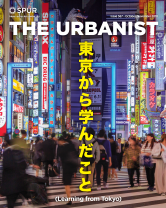Issue 567 /
to
Learning from Tokyo
Learning From Tokyo
How do other cities solve their urban problems? Each year SPUR takes a study trip to find out.
SPUR's recent study trip to Tokyo made even the most avid urbanists on our staff and board feel like country mice. Because Tokyo is so different, it’s easy for Americans to disregard it as a source of ideas for our own urban areas. But there’s a lot that the cities of the Bay Area can learn from the most populous metropolitan region on earth.
Falling in Love With the Trains of Japan
Unmatchable in their efficiency, reliability and speed, Japanese trains represent the bleeding edge of innovative modern transport.
Japan’s extensive railway system carries nearly 30 percent of all rail passengers in the world, more than all of Europe. But unlike many European countries, Japanese rail companies are privatized. The largest of these companies carries 17 million passengers per day and its $26 billion in annual revenue includes no government subsidies. How is this possible and what can California learn from the Japanese system?
Urban Field Notes: Tokyo — Exuberant and Alive
On this city’s streets there’s almost too much to take in.
Seen from a tall building, Tokyo’s vast scale is apparent, a largely undifferentiated metropolis to the horizon. But on the ground level, variegated towers on tight lots make for a rich and dynamic texture. Though the city hosts some magnificent architecture, many of the buildings are mundane or downright ugly. The urbanism, however, is exuberant and alive.
The Uncertainty Paradox
Why embracing multiple futures in transportation planning will help us get the future we want.
Transportation isn’t as predictable as one might think. The profession's standard forecasts and projections are convenient fictions that oversimplify a complex system and mislead us into thinking we know what the future will bring. Luckily, some transportation agencies are now publicly admitting uncertainty about where things might be headed in the future and are embracing new ways to tackle that uncertainty in their planning.
Member Profile: Kay Flavell
Kay Flavell has been researching and writing about people, buildings and streets for decades.
Since leaving her native New Zealand at 21, Kay Flavell has led a nomadic academic life, teaching 18th-century German literature at University College London, collecting oral histories in Liverpool and serving as associate director of the UC Davis Humanities Institute. Today, Flavell is the director of New Pacific Studio, a small multi-disciplinary artist residency program based in Vallejo.
